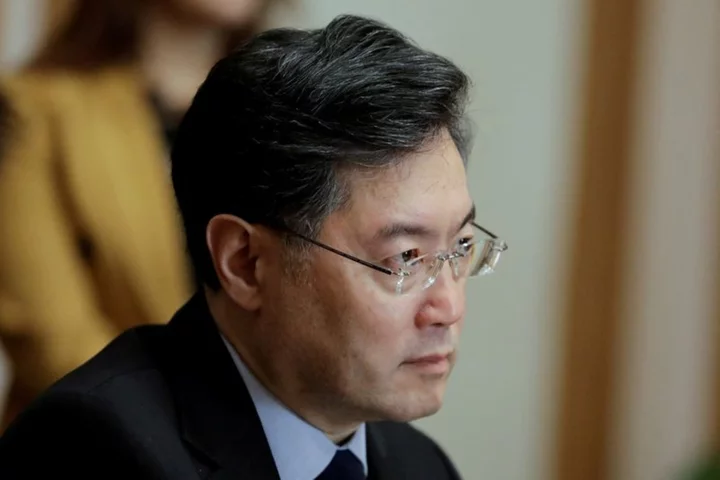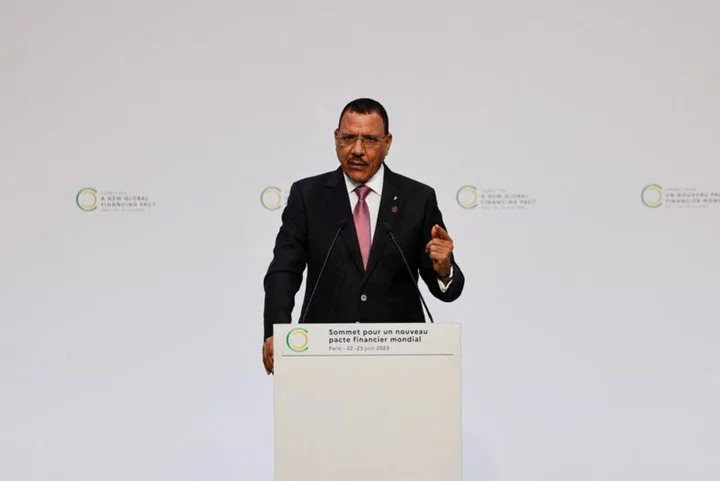By Yew Lun Tian and Laurie Chen
BEIJING (Reuters) -China named veteran diplomat Wang Yi its new foreign minister on Tuesday, removing former rising star Qin Gang after a mysterious one-month absence from duties barely half a year into the job.
Qin, 57, a former aide to President Xi Jinping and envoy to the United States, took over the ministry in December but has not been seen in public since June 25 when he met visiting diplomats in Beijing.
The ministry has said he was off work for health reasons but gave no details, sparking speculation and drawing attention to the secrecy often surrounding China's Communist leadership and decision making.
Qin's successor Wang, 69, was also his predecessor, holding the post from 2013-2022 as ties frayed with rival superpower the United States to a point Beijing described as an all-time low.
He has filled in for Qin during his absence and represented China at a national security advisers' meeting of BRICS countries in Johannesburg, South Africa this week.
State media did not report why Qin was removed from office and China's foreign ministry did not respond to a request for comment. Xi signed a presidential order to make the decision effective, state news agency Xinhua reported.
"The lack of an explanation opens more questions than provides answers," said Ja Ian Chong, associate professor of political science at National University of Singapore.
"It also underscores the opacity and unpredictability, even arbitrariness in the current political system."
It is not the first time there has been an unexplained absence of officials in China.
Industry minister Xiao Yaqing disappeared from public view for nearly a month last year before it was revealed he was being investigated for corruption.
RATIONAL CHOICE
Qin was one of China's youngest foreign ministers, enjoying a meteoric ascent that analysts partly attributed to his closeness to Xi. He was twice foreign ministry spokesman, between 2006-2014, and chief protocol officer from 2014-2018, overseeing many of Xi's contacts with foreign leaders.
He headed to Washington as ambassador in July 2021, after a period of unusual public vitriol between U.S. and Chinese officials.
Wang was promoted to the politburo of the Chinese Communist Party, one of China's top leadership bodies.
He retakes the foreign ministry post as China seeks to re-engage with the world after years of COVID-induced isolation, as a mooted economic recovery fails to gain hold and the country spars with the United States over issues from Ukraine, Russia and Taiwan to trade and technology disputes.
"The choice of Wang Yi is rational," said Yun Sun, director of the China Program at the Stimson Center in Washington.
"To convey a sense of stability and credibility, China needs to select someone who is senior, authoritative and impeccable," she said.
Hours after news of his appointment broke, Pakistan's Foreign Minister Bilawal Bhutto Zardari tweeted his congratulations, saying Wang was "an astute and seasoned diplomat".
As for Qin's political future, that remains unclear, say analysts, pointing out that there has not yet been any clarity over whether he will still hold his role as state councillor, a member of China's cabinet.
"Qin’s removal without explanation has left intact the rumors and speculation about his disappearance," Dali Yang, a political science professor at the University of Chicago.
"His fate is left hanging and is a glaring reminder of the opacity of the Chinese political system."
(Reporting by Yew Lun Tian, Laurie Chen and Martin Quin Pollard; Editing by John Geddie, Nick Macfie, Andrew Cawthorne and Bernadette Baum)









